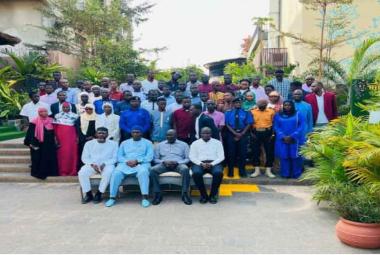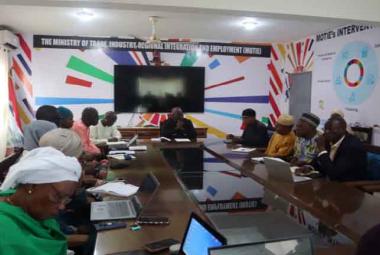By Awa Sowe
The Managing Director of Gambia Ports Authority (GPA) has reassured stakeholders of government’s commitment to creating conducive business environment. He assured that businesses operating around the port would not be adversely affected by the expansion.
Mr Ousman Jobarteh was recently speaking during a high-level stakeholders’ meeting organised by The Gambia Ports Authority (GPA), in collaboration with the Gambia Revenue Authority (GRA) and officials of Albayrak Group. The meeting was meant to discuss the multimillion-dollar port expansion project. The discussions addressed concerns and technicalities related to the project, including the contract awarded to the Turkish conglomerate.
“The agreement between the government and Albayrak Group includes financing, rehabilitation, maintenance, and operation of the Port of Banjul, as well as the Basse and Kaur inland ports,” Jobarteh stated.
The GPA boss said the Sanyang Deep Seaport would be a cornerstone in boosting The Gambia’s trade opportunities.
He also addressed the necessity of the concession agreement, noting that GPA lacks the infrastructure and resources to compete with other regional ports. “Ports that have remained competitive in the sub-region have entered into similar concession agreements,” he explained.
Albayrak Group, a key player in global port operations, secured the contract last year, prevailing over competitors from Saudi Arabia, France, and Morocco. The agreement was formalised with the Gambian government, granting Albayrak the responsibility to manage and modernise the country’s primary port facilities.
The government’s decision to enter the concession agreement followed mounting criticism over GPA’s inadequate capacity to handle increasing maritime traffic. This shortfall had caused significant cargo destined for Banjul to be redirected to Dakar, Senegal.
Under the agreement, Albayrak is set to invest €20.5 million in upgrading the Banjul Port, The Gambia’s only commercial port. This initiative aims to maintain its operational status, while the construction of the new $1 billion deep seaport at Sanyang progresses. The Sanyang Port, expected to be completed within six years, will operate under a 30-year concession plan. The overarching goal is to reclaim maritime traffic lost to neighboring ports due to outdated infrastructure.
Mr Alhagie Mbye, Commissioner of Customs, praised the agreement, citing it as a timely solution to the inefficiencies that have plagued the port’s operations. He highlighted the GRA’s contributions to digitalising customs processes, including the installation of a weighbridge to ensure accurate cargo measurements.
“These reforms have significantly enhanced our operations and would not have been successful without an efficient port,” Mbye remarked.
Stakeholders welcomed the project, emphasising the need for effective implementation to ensure long-term benefits for the country’s economy. They urged the GPA and Albayrak Group to maintain transparent communication and involve all affected parties throughout the expansion process.
The meeting concluded with a commitment from GPA to continue engaging communities and stakeholders, ensuring inclusivity and collaboration in transforming The Gambia’s port infrastructure into a regional hub.
The forum, brought together a wide range of stakeholders, including government officials, dockworkers, clearing agents, and business leaders. Discussions focused on fostering collaboration to enhance service delivery, improve operational efficiency, and promote economic growth.
In May 2024, The Gambia Ports Authority launched the technical expansion project of the Ports through a grant component with the African Development Bank (AfDB) worth $20.5 million.
The main objectives of this project are to enhance The Gambia’s regional competitiveness and ensure climate resilience of the Port of Banjul. The specific development objectives include to reduce ship waiting time, avoid costly congestion, overloads, facilitate reduction in sea freight costs and demurrage payments at the Banjul Port; provide additional capacity to meet the present and future forecast levels of traffic requirements including container traffic; improve Port efficiency, operations and management by renewed and digitalized procedures and computerisation; facilitate improved traffic flow in and around the access roads leading to the Port and make the road climate-resilient; and maintain cost-effective and reliable ferry services by introducing green and low emitting ferries.
It is also believed that the expansion project would add value to some of the infrastructure and the capacity development needs to reposition the Ports.







